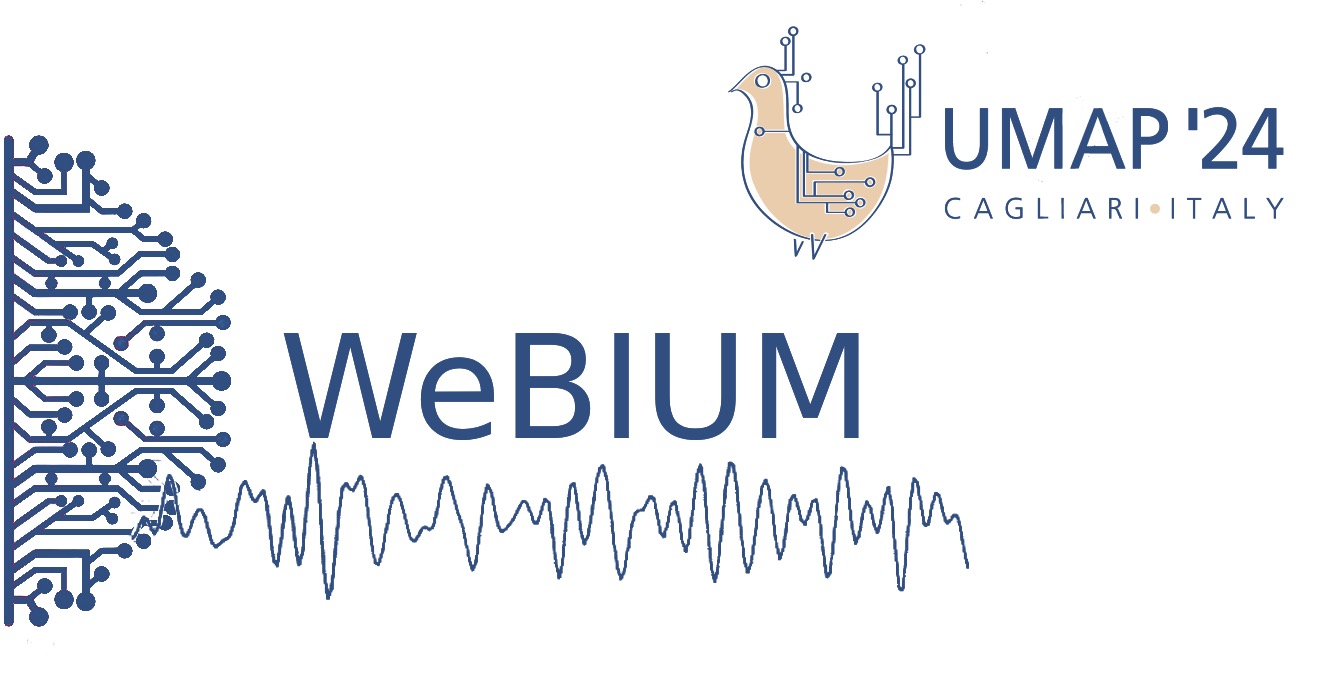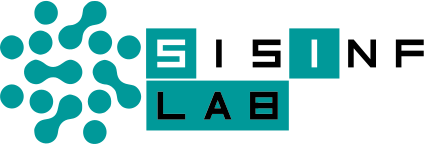DESCRIPTION
Wearable Devices (WDs), encompassing a spectrum from smartwatches to fitness trackers, continuously furnish a wealth of physiological and activity-related data. This trove of information facilitates the creation of robust user models, offering a dynamic lens into users’daily lives, health patterns, and interaction behaviours. Furthermore, the integration of Brain-Computer Interfaces (BCIs), directly interfacing with neural signals, presents a distinctive vantage point into cognitive processes and emotional states. This integration enriches user models, providing a profound understanding of mental states and engagement levels. While BCIs cannot be strictly categorized as WD s, the latest hardware developments are reaching a size comparable to earphones, anticipating their wearable integration in the near future. However, the exploitation of data from these devices for user modelling and profiling, enhancing personalized activities such as music listening and movie watching, remains an area ripe for exploration.
This workshop proposes an in-depth exploration of the transformative impact that data from WDs and BCIs can exert on user modelling. This initiative seeks to pave the way for a nuanced comprehension of individual preferences, cognitive states, and overall user experiences. The workshop invites researchers, practitioners, and enthusiasts to the convergence of wearable technology, BCIs, and user modelling. Through interactive sessions and discussions, participants will delve into the methodologies, challenges, and opportunities associated with harnessing data from these innovative sources. By fostering collaboration and facilitating knowledge exchange, the workshop aims to propel the current understanding of user modelling by exploiting WD s and BCIs. Attendees will acquire insights into cutting-edge research findings, practical applications, and potential future developments within this rapidly evolving field. Ultimately, the workshop aspires to inspire new research directions, catalyze interdisciplinary collaborations, and cultivate innovative solutions that leverage the synergy between wearable technologies and BCIs to elevate the field of user modelling to unprecedented heights.
OBJECTIVES
The 1st Workshop on Wearable Devices and Brain-Computer Interfaces for User Modelling (WeBIUM) is dedicated to exploring the comprehensive utilization of data derived from Wearable Devices (WDs) and Brain-Computer Interfaces (BCIs) to elevate the user experience through enhanced user profiling and modelling. The primary objective is to catalyze research endeavours that leverage WDs and BCIs to obtain real-time biological data, thereby advancing the precision of user profiling. WeBIUM is committed to fostering innovations in user modelling, with the overarching goal of improving user engagement and satisfaction through the provision of more accurate contextual and user information to personalization algorithms. This commitment aligns with the insights presented in existing literature. WeBIUM endeavours to facilitate meaningful discussions and knowledge exchange among researchers and practitioners on the implementation of solutions that harness WDs and BCIs data. The workshop specifically aims to:
- Share cutting-edge research and methodologies encompassing new design technologies and evaluation approaches
- Identify and address forthcoming challenges in the interdisciplinary realm of WDs, BCIs, and AI
- Recognize emerging issues that warrant attention within the broader field
By providing a place for interdisciplinary collaboration, WeBIUM aspires to forge a community dedicated to leveraging WD and BCI data for user profiling. We encourage active participation from researchers and practitioners alike, fostering an environment conducive to collaborative exploration and the exchange of innovative ideas.
TOPICS
Topics of interest include, but are not limited to:
- Signal processing methods for wearable sensor data
- Machine and Deep learning algorithms for user behaviour analysis from WD and BCI data
- Real-time data processing challenges and solutions
- Privacy concerns in collecting and analyzing WD and BCI data
- Security measures for protecting user data from WDs
- Ethical implications of using WD and BCI data for personalized experiences
- Development of user models based on WD and BCI data
- Personalization strategies for improving user profiles
- Challenges in creating accurate and dynamic user profiles based on WDs and BCIs
- User modelling in immersive digital environments
- User acceptance and adoption of WDs and BCIs
- Security aspects of using WDs for personal and environmental data
- Advanced Feature Modeling Architectures for WDs and BCIs
- Model interpretability in WD and BCI applications
- Evaluation metrics tailored for predictive models in the context of WDs and BCIs
- Innovative methodologies for user studies in wearable technologies
- Ethical considerations in conducting user studies exploring WDs and BCIs
CATEGORIES OF SUBMISSIONS:
- Long Research Papers: These are reserved for reports on mature original research results. The expected length of a long paper submission should be in the range of 8-14 pages of content, plus up to 3 pages for references.
- Short Research Papers: Authors may choose this category if they wish to report on smaller case studies or ongoing original research efforts. The expected length of a short paper submission should be in the range of 4-7 pages of content, plus up to 2 pages for references.
- Position Papers: These deal with novel unexplored research ideas or viewpoints which describe trends or fruitful starting points for future research and elicit discussion. The expected length of a position paper submission should be 2 pages of content, plus up to 2 pages for references.
- Demo Submissions – System Papers: Authors who wish to demonstrate their system may choose this category and provide a description of their system and demo. The expected length of a demo/system paper submission should be up to 5 pages of content, plus up to 2 pages for references.
PROGRAM COMMITTEE
- Carmelo Antonio Ardito - Università LUM “Giuseppe Degennaro”, Italy
- Giuseppe D’Aniello - Università of Salerno, Italy
- Pietro Pinoli - Politecnico di Milano, Italy
- Elvira Brattico - Aarhus University, Denmark
- Hasan Ayaz - Drexel University, Philadelphia, USA
- Yehia Ibrahim - University of Liverpool, UK
- Yalin Zheng - University of Liverpool and Liverpool Heart and Chest Hospital, UK
- Daniele Malitesta - Centralesupelec, Université Paris-Paclay, Paris, France
- Tiago Falk, University of Quebec, Canada
- Andrea Pazienza, NTT DATA Italia SpA
- Noemi Mauro, University of Torino
- Eelco Herder, Utrecht University
IMPORTANT DATES
April 15, 2024: abstract and title submission (mandatory)April 24,May 3, 2024: paper submission- May 8, 2024: notification to authors
- May 16, 2024: camera-ready due
During the submission process select “1st Workshop on Wearable Devices and Brain-Computer Interfaces for User Modelling”.
PROGRAM
The 1st Workshop on Wearable Devices and Brain-Computer Interfaces for User Modelling - WEBIUM24, will take place on Thursday, July 4, from 9.00 to 12.30.
- 09.15-10.30: Paper Presentation 1
- 09.15-09.40: Marzo S. et al. - “Exploring the Usability and Trustworthiness of AI-Driven User Interfaces for Neurological Diagnosis”.
- 09.40-10.05: Mongardi S. et al. - “Exploring Federated Learning for Emotion Recognition on Brain-Computer Interfaces”.
- 10.05-10:30: Festa F. et al. - “EmoSynth Real Time Emotion-Driven Sound Texture Synthesis via Brain-Computer Interface”.
- 10.30-11.00: Coffee Break
- 11.00-11.45: Paper Presentation 2
- 11.00-11.25: Kumar K. et al. - “Assessing Human Visual Attention in Retail Human-Robot Interaction: A YOLOv8-Nano and Eye-Tracking Approach”.
- 11.25-11.50: Biancofiore G. M. et al. - “ARIEL: Brain-Computer Interfaces meet Large Language Models for Emotional Support Conversation”.
- 11.50-12.20: Panel discussion with the Authors of the accepted papers
- 12.20-12.30: Closing Remarks
ORGANIZERS
Tommaso Colafiglio
Ph.D. Student at Sapienza University of Rome, Italy
Email: tommaso.colafiglio@uniroma1.it
Website: https://sisinflab.poliba.it/people/tommaso-colafiglio/

Tommaso Di Noia
Full Professor at Polytechnic University of Bari (Italy)
Email: tommaso.dinoia@poliba.it
Website: https://sisinflab.poliba.it/people/tommaso-di-noia/

Domenico Lofù
Assistant Professor at Polytechnic University of Bari (Italy)
Email: domenico.lofu@poliba.it
Website: https://sisinflab.poliba.it/people/domenico-lofu/

Angela Lombardi
Assistant Professor at Polytechnic University of Bari (Italy)
Email: angela.lombardi@poliba.it
Website: https://sisinflab.poliba.it/people/angela-lombardi/

Fedelucio Narducci
Associate Professor at Polytechnic University of Bari (Italy)
Email: fedelucio.narducci@poliba.it
Website: https://sisinflab.poliba.it/people/fedelucio-narducci/

Paolo Sorino
Ph.D. Candidate at Polytechnic University of Bari (Italy)
Email: paolo.sorino@poliba.it
Website: https://sisinflab.poliba.it/people/paolo-sorino/



